

I have divided them only to make it easier to find resources. Inflammatory bowel disease more common in night owls - Hack your gut. Inflammatory bowel disease(IBD) refers to 2 conditions that present with chronic inflammation in the gut.

Crohn’s disease affects any part of the gut while ulcerative colitis involves only the colon/rectum. Over time, inflammatory bowel disease causes substantial damage to the gut. F. prausnitzii.
Crohn's Disease. Ulcerative Colitis. Necrotizing Enterocolitis. IBD vs. Crohn's disease vs. IBS: Symptoms, diagnosis, and treatment. Gut Microbiome: 33 Ways Gut Bacteria Affect Your Body and Mind. We share our bodies with our gut microbes. In fact, you could even say that a lot of what we are depends on the bacteria we carry. They can make us thin or fat, healthy or sick, happy or depressed. Science is just beginning to understand all the ways in which gut microbes affect our lives.
In this post, we review what is known about gut bacteria so far, including the ways in which they are shaping our bodies and our minds. Read on to find out: Discussing current inflammatory bowel disease research. Gut microbiota studies lead to new understandings of IBD. In inflammatory bowel disease (IBD), a set of conditions that includes Crohn’s disease and ulcerative colitis (UC), parts of the digestive tract become chronically inflamed.
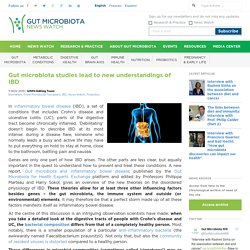
‘Debilitating’ doesn’t begin to describe IBD at its most intense: during a disease flare, someone who normally leads a busy and active life may have to put everything on hold to stay at home, close to the bathroom, battling pain and nausea. Genes are only one part of how IBD arises. The other parts are less clear, but equally important in the quest to understand how to prevent and treat these conditions. Baker's Yeast (S. cerevisiae) Found to Exacerbate Inflammatory Bowel Disease (IBD) – Another Nod to a Grain Free Diet for Autoimmunity!
Much of the focus of the gut microbiome has been on bacteria, but there are also yeasts, fungi and viruses that can affect gut health.
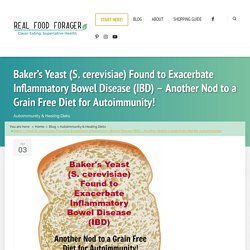
In a new study published in Science Translational Medicine, researchers found that the common yeast used in all bread products, Saccharomyces cerevisiae (S. cerevisiae), aggravated colitis and caused epithelial cell damage that caused greater gut permeability. We know that the microbiome of people with inflammatory bowel disease is different than people without it. There is less diversity and this may allow for the growth of populations of more potentially pathogenic organisms. The researchers innoculated mice with either S. cerevisiae or another yeast, R. aurantiaca – an environmentally acquired yeast found in milk and fruit juice. The mice were given the yeast over a period of a week, in order to recreate the usual way the yeast is introduced into the body – by way of food.
Now this should come as no surprise. The researchers noted that the results, Inflammatory Bowel Disease Infographic. IBD, Crohn's disease, and the microbiome — The American Microbiome Institute. In the study the researchers sampled and sequenced the microbiome of the gut mucosa and stool.
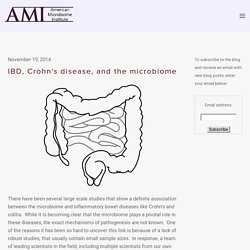
From this data, they identified specific bacteria that had higher abundances in diseased patients, like Enterobacteriaceae and Veillonellaceae, and others that had lower than normal abundances, such as Clostridiales and Bacteroidales. According to the samples, these relative abundances were more pronounced in the mucosal samples, rather than the stool samples, meaning that the mucosa may play a more important role in Crohn’s pathogenesis and diagnosis. Recipe for IBD: can we use food to control inflammatory bowel disease?
IBD is a group of chronic disorders characterized by relapsing inflammation of the gastrointestinal (GI) tract.
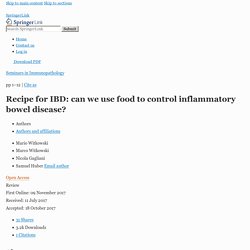
The most common entities are Crohn’s Disease (CD) and Ulcerative Colitis (UC). While CD is characterized by a segmental transmural inflammation and granulomatous lesions of the whole GI tract, inflammation in UC is mostly restricted to the colon and the rectum. Processed food, obesity and flagella – Rosemary Cottage Clinic Blog. Emulsifiers used in processed foods from ice cream to baked products have been implicated in obesity.

Earlier research in mice has now been extended using a model human gut, paving the way for human trials. Read on for the implications: Emulsifiers and obesity The relationship between processed foods, obesity and diabetes has not gone unnoticed. Societies that stick to traditional, unprocessed foods have lower levels of these diseases than countries that consume more industrial products. Industrialisation of the food chain has increased the use of artificial additives including sweeteners, emulsifiers and preservatives. The key factor informing this research is the recently discovered microbiome – the community of bacteria that live in the gut.
So it is interesting to hear of research into another class of additives – emulsifiers which adds to the story of issues around processed foods. How relevant this is to human health remains to be seen. Gut fungi might be linked to obesity and inflammatory bowel disorders. IBS/IBD – Recent Studies. These are some note from reviewing recent studies.

I view IBS potentially cascading into IBD, UC or Crohn’s disease is some subset of patients. “Findings from epidemiology studies indicate that diets high in animal fat and low in fruits and vegetables are the most common pattern associated with an increased risk of IBD. Low levels of vitamin D also appear to be a risk factor for IBD. …. Unfortunately, omega 3 supplements have not been shown to decrease the risk of relapse in patients with Crohn’s disease. … Although fiber supplements have not been definitively shown to benefit patients with IBD, soluble fiber is the best way to generate short-chain fatty acids such as butyrate, which has anti-inflammatory effects. Changes in microbiome due to antibiotic exposure may increase risk for inflammatory bowel disease. November 27, 2017 Exposure to antibiotics in mothers may increase risk for inflammatory bowel diseases in their offspring.
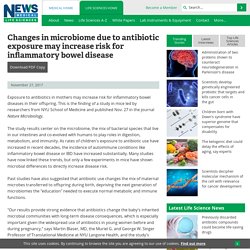
This is the finding of a study in mice led by researchers from NYU School of Medicine and published Nov. 27 in the journal Nature Microbiology. Probiotics are a good choice in remission of inflammatory bowel diseases: A meta analysis and systematic review - Ganji-Arjenaki - 2017 - Journal of Cellular Physiology. Altered gut bacteria and bacterial metabolic pathways are two important factors in initiation and progression of inflammatory bowel disease (IBD).
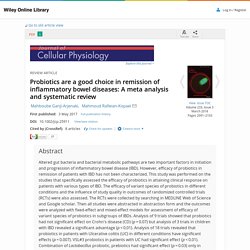
However, efficacy of probiotics in remission of patients with IBD has not been characterized. AIP for IBD: The Paleo Autoimmune Protocol and Inflammatory Bowel Disease. Effects of Probiotics on Gut Microbiota in Patients with Inflammatory Bowel Disease: A Double-blind, Placebo-controlled Clinical Trial. Efficacy And Tolerability Of The Autoimmune Protocol Diet For Inflammatory Bowel Disease. Low FODMAP diet can decrease abdominal pain in children Previous research has shown that adults with irritable bowel syndrome (IBS) who adopt a low FODMAP (fermentable oligosaccharides, disaccharides, monosaccharides and polyols) diet show an improvement in symptoms within 2 days.
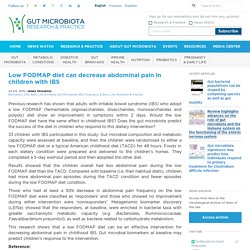
Would the low FODMAP diet have the same effect in childhood IBS? Does the gut microbiota predict the success of the diet in children who respond to this dietary intervention? What pediatric IBD patients reveal about inflammation. Inflammatory Bowel Disease (IBD) involves aspects of both the host and the microbiota. Previous research in adults shows that IBD is associated with microbiota differences, but little is known about this association in pediatric patients. This study from Helsinki, Finland, addressed the intestinal microbiota and inflammation in pediatric IBD.
Messages about diet and IBD need to change. When Dr. Deanna Gibson began studying patients with inflammatory bowel disease (IBD), she found it strange that scientists knew very little about how diet — a controllable factor — could alter gut microbes and gut immune responses. “[In] inflammatory bowel diseases, we know that environment is playing a role. The sheer dramatic rise in the incidence of them cannot be explained by genetics,” Gibson says.
“For me, [diet] was the number one factor that was logical.” Dr. “We’re talking about people who are malnutritioned, especially pediatric populations. Inflammatory Bowel Disease May Be from Mom's Bacteria, not DNA. Your mother's DNA may have determined your eye color, but some traits that you thought came from her may instead have come from the DNA of bacteria she passed on to you soon after birth, a new study finds. The study found that a mother mouse can pass along to her offspring a susceptibility to intestinal disorders, such as inflammatory bowel disease, by way of a gut-residing bacterium called Sutterella, the researchers reported in the journal Nature yesterday (Feb. 16). Scientists have long speculated that a mother can transfer beneficial bacteria to her offspring through the birthing process and then through breast-feeding and kissing.
These myriad bacteria species quickly spread and cover an infant's skin, mouth and digestive tract. "The implications for mouse experiments are profound, and could help us cut through some persistent sources of confusion," in genetic research, said Dr. Viruses in the gut connected to inflammatory bowel disease — The American Microbiome Institute. A new study has shown that the composition of viruses in the gut may play an important role in inflammatory bowel diseases (IBD). If you’ve been reading the blog for a while, you’ve seen us write about something called the virome. The virome is the collection of viruses in the body and similarly to the microbiome, it may have profound affects on human health.
This study led by scientists at Washington University in St. Epstein Barr Virus, Ulcers, Inflammatory Bowel Disease, and Other Gut Disorders. A gluten free diet and IBD — The American Microbiome Institute. The University of North Carolina recently published the results of a study based on a longitudinal internet survey conducted by the Crohn's and Colitis Foundation of America (CCFA). Leaky Gut & Gluten Belly: Bacterial Firebugs Translocate from Your Gut to Your Ever-Growing Visceral Fat Depots - SuppVersity: Nutrition and Exercise Science for Everyone. "Leaky gut", for decades one of those concepts, the belief in which divided self-proclaimed "real scientists" from their "hippie" counterparts, has eventually found its way to mainstream science. What began with a few tentative studies into the role of a pathologically increased gut permeability in Crohn's disease and co., is about to become a recognized research area with about 150 related publications within the first 9 month of 2011, alone.
The study comprised 22 patients with Chron's disease, 17 patients with ulcerative colitis and 21 controls, who were normal weight, had no history of diabetes mellitus and were not being treated with speci fic medications known to modulate visceral fat. Advances in inflammatory bowel disease pathogenesis: linking host genetics and the microbiome. New therapies for inflammatory bowel disease: from the bench to the bedside. Silvio Danese Correspondence to Dr Silvio Danese, IBD Center, Division of Gastroenterology, Istituto Clinico Humanitas, Via Manzoni 56, 20089 Rozzano, Milan, Italy; sdanese@hotmail.com Abstract.
A better understanding of the impact of TNF and IBD. Yava L. Intestinal microbiota in functional bowel disorders: a Rome foundation report. + Author Affiliations Correspondence to Professor Magnus Simren, Department of Internal Medicine, Institute of Medicine, Sahlgrenska Academy, University of Gothenburg, Gothenburg S-41345, Sweden; magnus.simren@medicine.gu.se Contributors The Working Team was led by MS and GB. Recent advances in inflammatory bowel disease: mucosal immune cells in intestinal inflammation. + Author Affiliations. Iron Deficiency Often Overlooked in Irritable Bowel. Vitamin D, immune regulation, the microbiota, and inflammatory bowel disease. Margherita T Cantorna. Email: mxc69@psu.edu The inflammatory bowel diseases are complex diseases caused by environmental, immunological, and genetic factors.